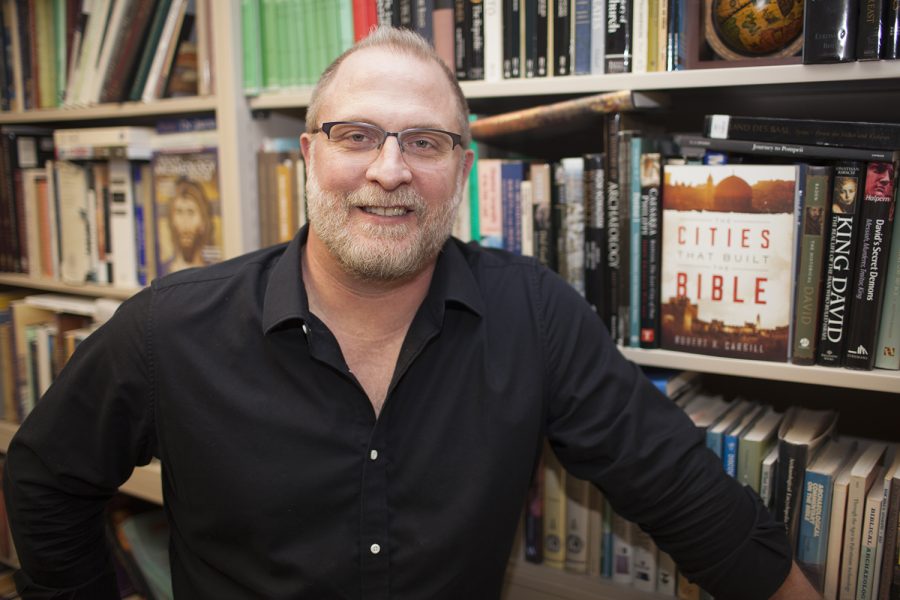UI religious-studies professor assists in History Channel docu-series ‘Jesus: His Life’
UI Assistant Professor Robert Cargill served as a series consultant on the History Channel docu-series ‘Jesus: His Life,’ airing March 25, telling the life of Jesus through the styles of both a drama and documentary.
Professor Bob Cargill of the UI Departments of Religious Studies and Classics poses for a picture on Wednesday, March 13, 2019. He is featured in the History Channel’s 8-part documentary series called “Jesus: His Life.”
March 24, 2019
While filming on the History Channel set, Assistant Professor Robert Cargill had the opportunity to add his voice to the discussion of the life of Jesus Christ.
The University of Iowa’s Cargill of the Religious Studies and Classics Departments will be featured in “Jesus: His Life” today on the History Channel. Cargill, among other researchers, was invited to be a consultant in the eight-part series in addition to making special appearances on screen.
The series tells the story of the life of Jesus using the style of both a drama and a documentary. In his work on the show, Cargill said the excellent script and acting used in the docudrama, combined with the emphasis on historical accuracy, make it stand out from other historical programs.
“Each episode is the story of Jesus from a different point of view, including … people who were antagonistic toward him,” he said. “And so it was a beautiful blend of not only these different points of view of Jesus being portrayed by the actors, it was also a wonderful diverse blend of different points of view from the scholars that are being interviewed as well.”
His teaching focuses on Judaism and Christianity in the first centuries BCE and CE, Cargill said. He has worked with the program’s production company, Nutopia, in the past, he said, and appreciates its serious acknowledgement of biblical scholarship.
“My favorite part is showing people — whether you’re Jewish, whether you’re Christian, whether you’re an agnostic or an atheist — that the Bible is actually a fascinating piece of literature, and it’s important for everyone to know something about it,” he said.
Mark Goodacre, a Duke University professor of religious studies, also worked as a series consultant and appeared in seven of the eight episodes. There was a 50-50 combination of drama and expert research-based information, he said.
He was honored to be featured in the program because of its unique interaction between expert commentators and dramatic action, he said.
“I’m very flattered that they’re interested in my opinions on these things,” Goodacre said. “As someone who is fascinated by the way that film depicts a biblical story anyway, it’s great to have people taking seriously my own thoughts, and it’s a huge privilege.”
Cargill said the UI’s value of public scholars and their work has given the Religious Studies Department national visibility through “Jesus: His Life.” Having his research and scholarship made available to the public is something that the university sees as important, he said.
“[The] University of Iowa, as a public university funded by taxpayers, understands the value of having its faculty speak directly to the public, whether it’s by giving public lectures or by doing nationally televised documentary programs,” he said.
Religious Studies Department Chair Morten Schlütter said the program shows the scholarly commitment and research of researchers such as Cargill.
“I think it’s wonderful for the department and gives us wonderful visibility and for the University of Iowa … I think it’s great that scholars like Robert Cargill are featured on these shows,” he said.
Cargill said “Jesus: His Life” represents how the Bible affects people’s daily lives, whether they are religious or not.
“Whether you’re religious or not, the text of the Bible impacts our daily lives because so many people believe it today,” he said.







